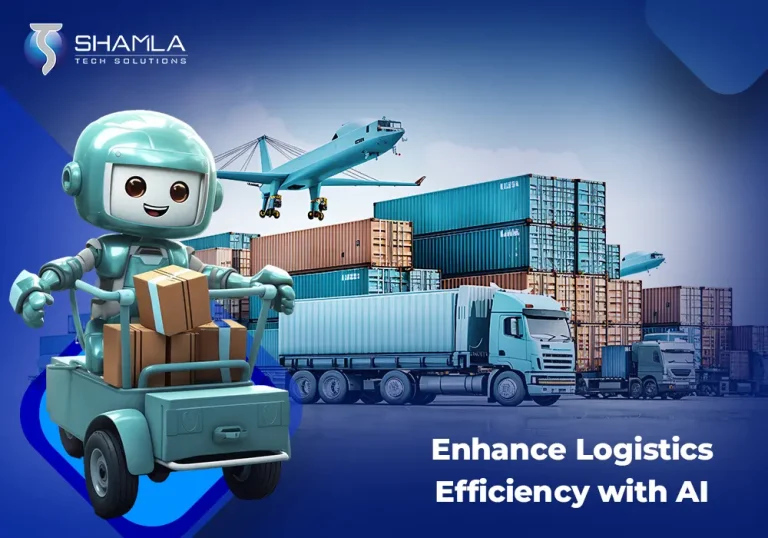1. Predictive Analytics for Demand Forecasting

How It Works
AI algorithms analyze vast amounts of data from various sources, including sales records, market reports, and social media trends. Machine learning models identify patterns and correlations that human analysts might overlook. This data-driven approach enables logistics companies to anticipate demand spikes or drops, adjust inventory levels accordingly, and optimize supply chain operations.
Benefits
- Inventory Optimization: Prevents overstocking or stockouts by maintaining optimal inventory levels.
- Cost Reduction: Reduces warehousing and transportation costs by aligning supply with demand.
- Enhanced Customer Satisfaction: Ensures products are available when and where customers need them.
- Predictive analytics powered by AI in logistics and supply chain management is transforming how companies plan and execute their operations, leading to more efficient and cost-effective logistics processes.
2. Route Optimization and Fleet Management
How It Works
AI algorithms process real-time data from GPS, traffic reports, and weather forecasts to determine the most efficient routes for delivery trucks. Machine learning models continuously learn from past data to improve route planning. Additionally, AI-powered fleet management systems monitor vehicle performance, maintenance needs, and driver behavior.
Benefits
- Reduced Fuel Consumption: Optimizes routes to minimize fuel usage and reduce carbon emissions.
- Improved Delivery Times: Ensures timely deliveries by avoiding traffic congestion and other delays.
- Enhanced Fleet Utilization: Maximizes the use of available vehicles, reducing idle time and maintenance costs.
- AI in logistics companies is revolutionizing fleet management and route optimization, leading to significant cost savings and improved operational efficiency.
3. Automated Warehousing and Robotics
How It Works

AI-powered robots and automated systems handle repetitive tasks such as picking, packing, and sorting items in warehouses. These systems use computer vision and machine learning to navigate warehouse environments, identify products, and perform tasks with precision. AI algorithms also manage inventory levels, track stock movements, and predict replenishment needs.
Benefits
- Increased Productivity: Robots can work 24/7 without fatigue, significantly increasing warehouse productivity.
- Reduced Labor Costs: Automation reduces the need for manual labor, lowering operational costs.
- Enhanced Accuracy: AI-powered systems minimize human errors in picking and packing, ensuring order accuracy.
- AI in logistics and supply chain management is driving the adoption of automated warehousing solutions, leading to more efficient and cost-effective operations.
4. Enhanced Customer Experience with AI Chatbots
How It Works
AI chatbots use natural language processing (NLP) and machine learning to understand and respond to customer queries. These chatbots can handle a wide range of tasks, from tracking shipments and providing delivery updates to answering frequently asked questions. AI algorithms analyze customer interactions to continuously improve the chatbot’s performance.
Benefits
- 24/7 Availability: AI chatbots provide round-the-clock customer support, ensuring timely responses.
- Personalized Service: AI can tailor responses based on customer preferences and past interactions.
- Scalability: Chatbots can handle multiple customer queries simultaneously, improving efficiency.
- AI in logistics companies is enhancing customer service by deploying chatbots and virtual assistants, leading to higher customer satisfaction and loyalty.

5. Predictive Maintenance for Fleet and Equipment
How It Works
AI systems analyze data from sensors embedded in vehicles and equipment to monitor their health and performance. Machine learning models identify patterns and anomalies that indicate potential failures. Based on this analysis, AI predicts when maintenance is needed and schedules it before a breakdown occurs.
Benefits
- Reduced Downtime: Prevents unexpected equipment failures, minimizing downtime.
- Lower Maintenance Costs: Schedules maintenance activities based on actual equipment condition, reducing unnecessary maintenance.
- Extended Equipment Life: Proactive maintenance extends the lifespan of vehicles and equipment.
- Predictive maintenance powered by AI in logistics and transportation is enhancing the reliability and efficiency of logistics operations, leading to cost savings and improved service levels.
Future of AI in Logistics
The future of artificial intelligence in logistics is promising, with continuous advancements expected to drive further improvements in efficiency, cost savings, and customer satisfaction. Key trends to watch include:
- Integration of AI and IoT: Combining AI with the Internet of Things (IoT) will enable real-time monitoring and optimization of logistics operations.
- Advanced Robotics: The development of more sophisticated robots will further enhance automation in warehousing and transportation.
- AI-Driven Supply Chain Optimization: AI will play a central role in optimizing entire supply chains, from sourcing and production to distribution and delivery.
- AI in logistics and supply chain management will continue to evolve, offering new opportunities for innovation and growth.

Conclusion
Artificial intelligence is transforming the logistics industry, offering innovative solutions for demand forecasting, route optimization, automated warehousing, customer service, and predictive maintenance. AI in logistics is enhancing efficiency, reducing costs, and improving customer satisfaction, making it a critical component of modern logistics operations.
As AI technology continues to advance, its impact on logistics and transportation will only grow, driving further improvements and innovation. By embracing AI, logistics companies can stay ahead of the competition, deliver superior service, and achieve long-term success.
AI in logistics and transportation is not just a trend but a revolution that is reshaping the industry. With the right strategies and investments, companies can harness the power of AI to transform their logistics operations and build a more efficient, cost-effective, and customer-centric supply chain.
Embrace the future of logistics with AI and unlock the full potential of your operations. The journey to smarter logistics starts now.








